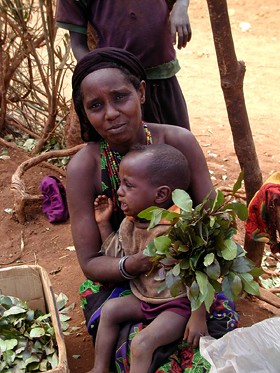Barrett calls for global collection of data on underfed
By Krishna Ramanujan
On any given day, some 1 billion people don't have enough food to meet their daily energy requirements. And even though world governments discuss plans to address global hunger and food security issues, reliable data on who consistently lacks food, and when, where and why they are suffering is unavailable.
To address this issue, Chris Barrett, Cornell's Stephen B. and Janice G. Ashley Professor of Applied Economics and Management and an expert on poverty and international development, calls for "a global network of sentinel sites," stations around the world to gather consistent long-term, internationally comparable data on such physical measurements as heights, weights and ages; standard household and socio-economic data; and people's perceptions of their own sense of food security. His invited "Perspectives" piece on the challenges of measuring food insecurity was published in the Feb. 12 issue of Science (327:5967).
"The standard definition of food security is people having access to adequate food for a healthy, fulfilling life," said Barrett. But measuring food security is fraught with problems, such as getting experts to agree on standard measurements that would accurately estimate how many people are persistently undernourished within countries.
"What constitutes a healthy diet is not clear to everyone," said Barrett. Also, types of measurements vary from one country to another, making international comparisons inconsistent, with widely different estimates of food insecure people.
Typically, measurements record different phenomena related to food security and, therefore, fail to provide a complete picture. For example, global food production per capita has increased 12 percent since 1990, while the number of undernourished people has risen by 9 percent over the same period. In other words, agricultural productivity growth has not translated directly into improved food security.
"And recent global economic troubles have increased the number of people who are poor and food insecure," said Barrett.
Also, data relate to past circumstances, but policymakers are interested in the future when crafting policies. Measurements within countries mainly reflect national-scale food availability issues, but do not address issues related to global food distribution, access or whether people are healthy enough for their bodies to absorb food intake efficiently.
Collecting uniform and comprehensive data is key, said Barrett, because such measurements inform and drive policies that help people get the nourishment they need.
Get Cornell news delivered right to your inbox.
Subscribe